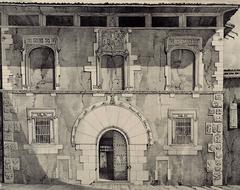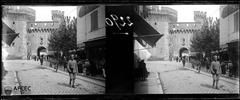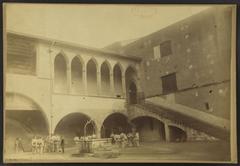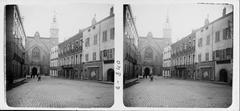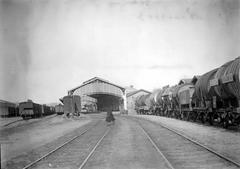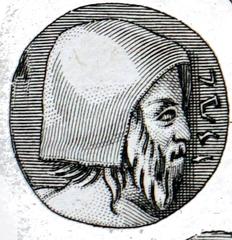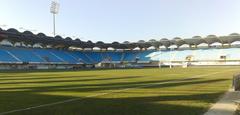
Château Du Parc Ducup Visiting Hours, Tickets, and Historical Guide to Perpignan’s Hidden Gem
Date: 04/07/2025
Introduction
Château Du Parc Ducup, located in the vibrant city of Perpignan in southern France, is a remarkable site that embodies the region’s industrial ascent, aristocratic refinement, and enduring cultural vitality. Originally built for the influential Bardou family—pioneers behind the JOB cigarette paper company—the château is a testament to both architectural innovation and local heritage. Designed around 1900 by Danish architect Viggo Dorph Petersen, the property fuses Parisian elegance with regional traditions, making it a must-see for architecture enthusiasts, history lovers, and travelers seeking an authentic Perpignan experience (Les Pyrénées-Orientales; La Semaine du Roussillon).
Over the decades, the château has transitioned from a private residence to a diocesan retreat, reflecting the city’s evolving social and spiritual landscape. Its pink façade, zinc roofs, and extensive English-style gardens offer visitors a serene yet captivating destination, accessible during special events and by reservation (Domaine Parc Ducup; GuidePlancul.fr).
Table of Contents
- Historical Overview and Founding Family
- Architectural Evolution and Design
- Transitions and Modern Use
- Visiting Hours, Tickets, and Practical Information
- Facilities, Accessibility, and Amenities
- Nearby Attractions in Perpignan
- Events, Guided Tours, and Cultural Life
- Frequently Asked Questions (FAQ)
- Tips for a Memorable Visit
- Conclusion and Call to Action
- Further Reading and References
Historical Overview and Founding Family
The château’s origins are rooted in the legacy of the Bardou family. Joseph Bardou founded the JOB cigarette paper enterprise, and his son Pierre Bardou expanded the family’s influence, commissioning grand estates for each of his children. Camille Bardou, one of Pierre’s daughters, received the land and oversaw the château’s development after marrying Charles Ducup de Saint-Paul, an artillery officer (Les Pyrénées-Orientales). The estate’s name honors this union, and the family’s legacy is commemorated by a monument at the St Martin cemetery.
Architectural Evolution and Design
Viggo Dorph Petersen’s Vision
The château was designed by Viggo Dorph Petersen, whose innovative architectural approach combined Parisian aesthetics with regional influences. Petersen’s portfolio in the Roussillon region includes other Bardou family estates, such as Château d’Aubiry and Château de Valmy (La Semaine du Roussillon).
Key Features
- Distinctive Pink Façade: The château is renowned for its striking pink exterior and zinc roofs reminiscent of Parisian mansions.
- Expansive Gardens: The English-style park features laurel, elm, and the famous Allée des Chênes (Avenue of Oaks), providing a tranquil setting for visitors.
- Auxiliary Structures: Historical plans included ambitious greenhouses, and the estate boasted wine cellars, stables, and staff accommodation, reflecting its dual role as a retreat and working estate (M2 Patrimoine UPVD).
Transitions and Modern Use
After Camille Bardou’s death in 1934, the estate shifted from private residence to religious and community use. The Catholic Diocese of Perpignan acquired the property, converting it into a center for catechism, youth retreats, and diocesan administration. The addition of the Jean-Paul II Chapel and installation of religious monuments within the park underscore its spiritual significance (Les Pyrénées-Orientales; Domaine Parc Ducup).
Visiting Hours, Tickets, and Practical Information
Opening Hours
- General Hours: The château and park are typically open from 9:00 AM to 6:00 PM, Monday to Saturday.
- Special Events: Hours may be extended or modified during religious ceremonies, retreats, or cultural events. Contact the Diocese or check the official website for up-to-date schedules.
Tickets and Admission
- Park Access: Free for casual visits or guests staying at the estate.
- Guided Tours: Available by appointment; tickets usually cost €10 per person, with group discounts.
- Event Attendance: Fees may apply for concerts, workshops, or special events.
Booking
- Reserve guided tours and group visits in advance via the official website or tourism office.
- Flexible cancellation policies are generally offered for accommodations.
Facilities, Accessibility, and Amenities
Accommodation
- Rooms: Modernized guest rooms and family suites, some with kitchenettes and garden views.
- Event Spaces: Multiple meeting and seminar rooms, with the largest accommodating up to 300 guests.
- Dining: Onsite restaurant serves traditional French cuisine, with breakfast available for an additional fee (Domaine Parc Ducup).
Accessibility
- Wheelchair access and adapted facilities in common areas and select rooms.
- Ample free parking; accessible restrooms available.
Other Amenities
- Free Wi-Fi.
- Landscaped gardens and walking paths.
- Laundry services and multilingual staff.
Nearby Attractions in Perpignan
Enhance your visit with these local highlights:
- Palace of the Kings of Majorca: Medieval fortress-palace with panoramic city views.
- Le Castillet: Iconic city gate and museum.
- Perpignan Cathedral (Saint-Jean-Baptiste): Noted for Gothic architecture and stained glass.
- Mediterranean Beaches: Canet-en-Roussillon and Argelès-sur-Mer are within a short drive.
- Local Vineyards: Wine tours and tastings are popular regional activities.
For more recommendations, consult Perpignan Tourism.
Events, Guided Tours, and Cultural Life
The château regularly hosts:
- Religious Retreats and Spiritual Gatherings: Organized by the Diocese and local parishes.
- Cultural Events: Concerts, art exhibitions, and seasonal festivals.
- Workshops and Conferences: Facilities support educational, corporate, and youth events (GuidePlancul.fr).
Advance booking for tours and events is recommended, particularly during peak seasons or festivals.
Frequently Asked Questions (FAQ)
Q: What are the château’s visiting hours?
A: Generally 9:00 AM to 6:00 PM, Monday to Saturday; hours may vary for private events or holidays.
Q: Is there an entrance fee?
A: Park entry is free; guided tours and special events may require tickets.
Q: How do I book a guided tour?
A: Arrange tours via the official website or Perpignan’s tourism office.
Q: Is the château accessible for people with disabilities?
A: Yes, with ramps and adapted restrooms available. Notify staff in advance for specific needs.
Q: Are pets allowed?
A: Pets may be permitted in some rooms with prior approval.
Q: Is parking available?
A: Free private parking is provided onsite.
Tips for a Memorable Visit
- Reserve in Advance: Especially for group visits, tours, and events.
- Check Event Schedules: Some areas may be restricted during private or religious functions.
- Wear Comfortable Shoes: The grounds are best explored on foot.
- Respect Spiritual Activities: Be mindful of ongoing services or retreats.
- Photography: Permitted in park areas—ask about interior photography during tours.
Conclusion and Call to Action
Château Du Parc Ducup is a tranquil retreat steeped in Perpignan’s history, architectural beauty, and community spirit. Whether attending a religious retreat, exploring the gardens, or participating in cultural events, visitors are welcomed into a unique setting that bridges past and present.
For the latest updates on visiting hours, tickets, and event programming, visit the official website or Perpignan Tourism. To enhance your trip, download the Audiala app for personalized guides and real-time information. Stay connected through social media to keep up with future happenings at Château Du Parc Ducup.
Further Reading and References
- Les Pyrénées-Orientales
- La Semaine du Roussillon
- Domaine Parc Ducup
- Perpignan Tourism
- letsbookhotel.com
- GuidePlancul.fr
- Wikipedia
- M2 Patrimoine UPVD
- Official Diocese of Perpignan Website


